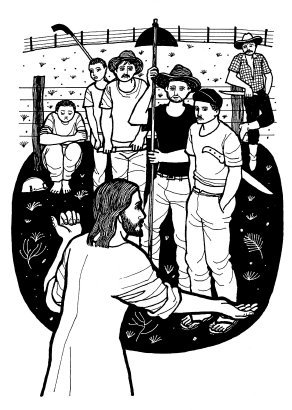Readings: 25th Sunday in Ordinary Time
First Reading
First Reading: Isaiah 55:6-9
Seek Yahweh while he may be found;
call to him while he is near.
Let the wicked abandon his way,
let him forsake his thoughts,
let him turn to Yahweh for he will have mercy,
for our God is generous in forgiving.
For my thoughts are not your thoughts,
my ways are not your ways, says Yahweh.
For as the heavens are above the earth,
so are my ways higher than your ways,
and my thoughts above your thoughts.
Responsorial Psalm
Responsorial Psalm: Ps 145:2-3,8-9,17-18
R./ The Lord is near to all who call upon him.
Every day will I bless you,
and I will praise your name forever and ever.
Great is the Lord and highly to be praised;
his greatness is unsearchable.
R./ The Lord is near to all who call upon him.
The Lord is gracious and merciful,
slow to anger and of great kindness.
The Lord is good to all
and compassionate toward all his works.
R./ The Lord is near to all who call upon him.
The Lord is just in all his ways
and holy in all his works.
The Lord is near to all who call upon him,
to all who call upon him in truth.
R./ The Lord is near to all who call upon him.
Second Reading Introduction: For me, "life" means Christ
For Paul, it doesn't matter much whether he lives or dies. Alive, he serves Christ; by dying he will be with Christ. But he is willing to continue working in the service of the gospel.
Second Reading
Second Reading: Philippians 1:20-24,27
Brothers and sisters, Christ will be exalted through my person, whether I live or die.
For to me, to live is Christ, and even death is profitable for me. But if I am to go on living, I shall be able to enjoy fruitful labor. Which shall I choose? So I feel torn between the two. I desire greatly to leave this life and to be with Christ, which will be better by far, but it is necessary for you that I remain in this life.
Try, then, to adjust your lives according to the Gospel of Christ.
Holy Gospel
Gospel Reading: Matthew 20:1-16
Jesus told his disciples this parable, "The kingdom of heaven is like a landowner who went out early in the morning to hire workers for his vineyard. He agreed to pay the workers a salary of a silver coin for the day, and sent them to his vineyard.
"He went out again at about nine in the morning, and seeing others idle in the square, he said to them: 'You, too, go to my vineyard and I will pay you what is just.' So they went.
"The owner went out at midday and again at three in the afternoon, and he did the same. Finally he went out at the last working hour - it was the eleventh - and he saw others standing there. So he said to them: 'Why do you stay idle the whole day?' They answered: 'Because no one has hired us.' The master said: 'Go and work in my vineyard.'
"When evening came, the owner of the vineyard said to his manager: 'Call the workers and pay them their wage, beginning with the last and ending with the first.' Those who had come to work at the eleventh hour turned up and were given a denarius each (a silver coin). When it was the turn of the first, they thought they would receive more. But they, too, received a denarius each. So, on receiving it, they began to grumble against the landowner.
"They said: 'These last hardly worked an hour, yet you have treated them the same as us who have endured the day's burden and heat.' The owner said to one of them: 'Friend, I have not been unjust to you. Did we not agree on a denarius a day? So take what is yours and go. I want to give to the last the same as I give to you. Don't I have the right to do as I please with my money? Why are you envious when I am kind?'
"So will it be: the last will be first, the first will be last."






